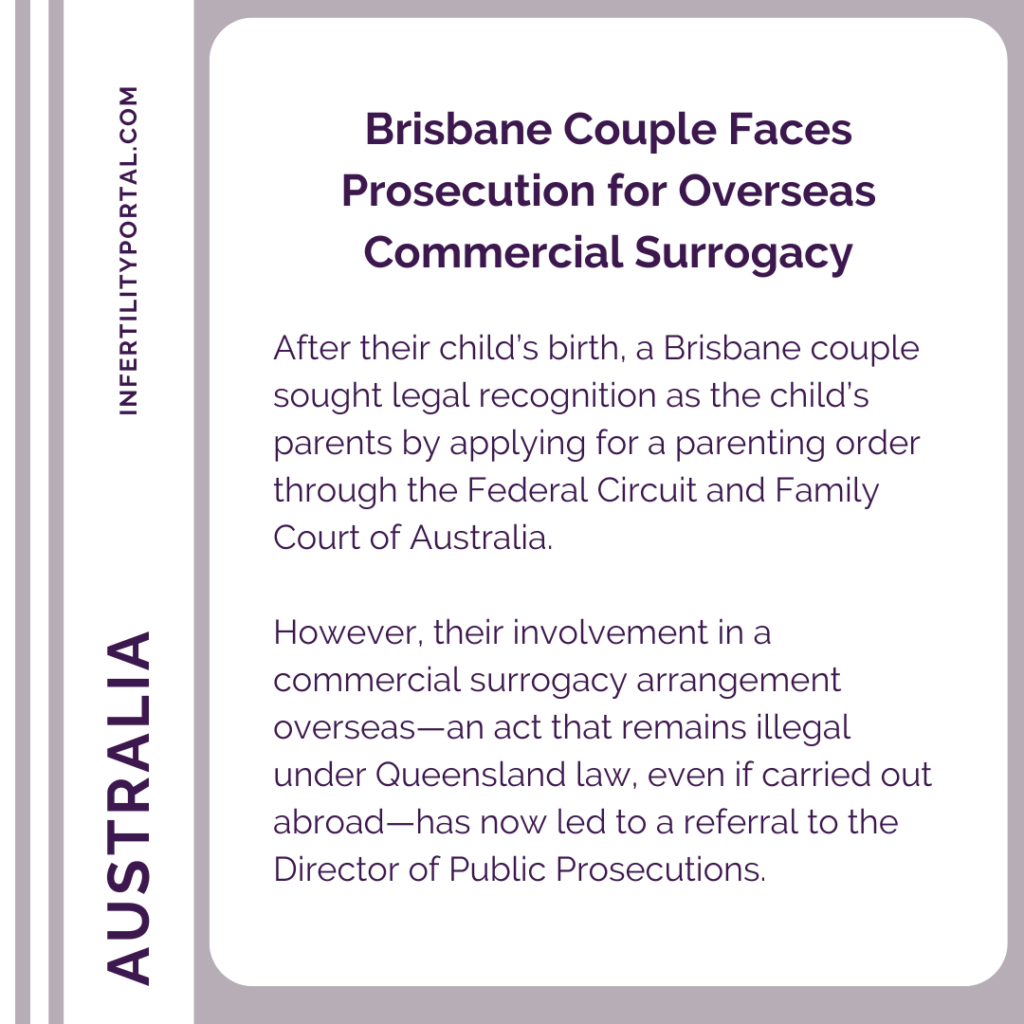In a landmark case that has captured national attention, a Brisbane couple faces potential criminal charges after admitting to engaging in a commercial surrogacy arrangement overseas—a practice that is illegal under Queensland law.
The Case Unfolds
In 2023, the couple entered into a commercial surrogacy agreement with a company based in the Turkish Republic of Northern Cyprus, paying approximately $95,000 to facilitate the process. This arrangement included locating a surrogate, sourcing anonymous donor eggs, and organizing the embryo’s implantation. The surrogate, a 37-year-old woman from the Turkish Republic of Northern Cyprus, carried the child to term and gave birth in 2024.
Following the birth, the couple sought a parenting order in the Federal Circuit and Family Court of Australia to be legally recognized as the child’s parents. However, Justice Catherine Carew dismissed their application, citing concerns that granting the order would circumvent Queensland’s laws prohibiting commercial surrogacy. She noted the lack of evidence regarding the surrogate’s consent, the child’s citizenship status, and the couple’s suitability as parents.
Legal Implications
Under Queensland’s Surrogacy Act 2010, entering into a commercial surrogacy arrangement, even overseas, is a criminal offense punishable by up to three years in prison. Justice Carew referred the case to the Queensland Director of Public Prosecutions to consider potential charges against the couple. Additionally, the couple’s lawyer was referred to the New South Wales Legal Services Commissioner for possible disciplinary action related to the handling of the case.
Broader Context and Calls for Reform
This case highlights the complexities and inconsistencies in Australia’s surrogacy laws, which vary significantly between states and territories. While altruistic surrogacy is legal nationwide, commercial surrogacy remains prohibited. Experts argue that these disparities lead many Australians to seek surrogacy arrangements overseas, often resulting in legal uncertainties for the children born through such means.
Family law specialists and advocacy groups are calling for a national framework to regulate surrogacy, emphasizing the need to protect the rights and welfare of all parties involved, especially the children. The Australian Law Reform Commission is currently reviewing the country’s surrogacy laws, with a report expected in mid-2026.
Conclusion
The Brisbane couple’s case serves as a cautionary tale for intended parents considering international commercial surrogacy. It underscores the importance of understanding and adhering to local laws and the potential legal ramifications of circumventing them. As Australia grapples with the ethical and legal challenges of surrogacy, this case may serve as a catalyst for much-needed legislative reform.
While legal frameworks must be upheld, it is important to recognize the emotional journey of intended parents. Many turn to surrogacy out of profound hope and longing to build a family. In seeking love and connection, they may unknowingly find themselves in legally precarious situations. Any legal response should consider the human context with empathy, ensuring that families are guided, not punished, through difficult circumstances.
Note: The Turkish Republic of Northern Cyprus is not the same as the Republic of Cyprus (commonly known as Cyprus). In 1974, Turkey invaded Cyprus, leading to the occupation of the northern part of the island. While the Republic of Cyprus is an EU member state, the Turkish Republic of Northern Cyprus is a self-declared entity recognized only by Turkey and is not recognized by the international community. Surrogacy laws and legal protections differ significantly between the two regions.
Do not be misled into believing you are entering into a legal surrogacy arrangement in Cyprus. In reality, you are entering into a surrogacy arrangement in a territory governed by Turkey, where surrogacy is illegal. This distinction has significant legal and ethical consequences for intended parents, surrogates, and children born through such arrangements.


